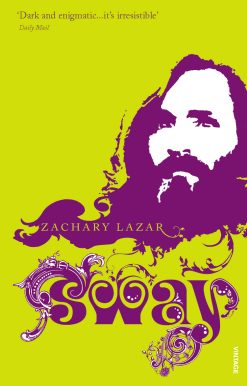Description
Nineteen-year-old Kate Brady joined the army to bring honor to her family and to the Middle East. Instead, she finds herself in a forgotten corner of the Iraq desert in 2003, guarding a makeshift American prison. There, Kate meets Naema Jassim, an Iraqi medical student whose father and little brother have been detained in the camp.Kate and Naema promise to help each other, but the war soon strains their intentions. Like any soldier, Kate must face the daily threats of combat duty, but as a woman, she is in equal danger from the predatory men in her unit. Naema suffers bombs, starvation, and the loss of her home and family. As the two women struggle to survive and hold on to the people they love, each comes to have a drastic and unforeseeable effect on the other’s life.Culled from real life experiences of female soldiers and Iraqis, Sand Queen offers a story of hope, courage and struggle from the rare perspective of women at war.
Additional information
| Weight | 0.44 kg |
|---|---|
| Dimensions | 2.01 × 14.03 × 21.06 cm |
| Format | |
| language1 | |
| Pages | 320 |
| Publisher | |
| Year Published | 2012-7-31 |
| Imprint | |
| Publication City/Country | USA |
| ISBN 10 | 1616951842 |
| About The Author | Helen Benedict, a Columbia University professor, has written four previous novels, five nonfiction books, and a play. Her novels have received citations for best book of the year from the Los Angeles Times and the Chicago and New York Public Libraries. |
Praise for Sand Queen“This is The Things They Carried for women in Iraq . . . feels right and true.”—The Boston Globe"Every war eventually yields works of art which transcend politics and history and illuminate our shared humanity. Helen Benedict’s brilliant new novel has done just that with this century’s American war in Iraq. Sand Queen is an important book by one our finest literary artists."—Robert Olen Butler "Benedict interviewed around 40 female veterans of the war in Iraq to tell this completely heartbreaking, vivid story of the particular difficulties of being not just a soldier, but a female soldier."—Bustle“One of this year’s best new novels about war.” —NPR, To the Best of Our Knowledge“[A] thrilling and thoughtful new novel . . . [Kate] is a character readers won't soon forget.”—Publishers Weekly“Funny, shocking, painful, and, at times, deeply disturbing, Sand Queen takes readers beyond the news and onto the battlefield.”—Booklist“This bleak novel explores the horrendous impact of the Iraq war on women, both soldiers and civilians . . . [an] unforgettable testament.”—Kirkus Reviews“An eye-opening glimpse into a life that many Americans have never seen.”—Library Journal“Told in compellingly vivid detail with the clear ring of truth every step of the way.”—The Free Lance-Star“If you missed out on serving in the Iraq War, you can, if you're willing, be catapulted right into the midst of some of its more challenging moments courtesy of Ms. Benedict's gutsy prose. Her interviews with over 40 female veterans show up as action flow and dialogue in Sand Queen, a novel that will leave you deeply unsettled if not shaken to the root of your being.”—The Herald-Dispatch"Every war eventually yields works of art which transcend politics and history and illuminate our shared humanity. Helen Benedict’s brilliant new novel has done just that with this century’s American war in Iraq. Sand Queen is an important book by one our finest literary artists."—Robert Olen Butler “Helen Benedict’s compelling story provides an intimate picture of what it means to be a soldier, what it’s like to live on the battlefield, and what the ethical choices are that our troops have had to make in Iraq. Benedict tells her story from two perspectives—that of a young American woman—a soldier—and a young Iraqi woman—a medical student—both of whose worlds are ravaged by the war. At times funny, at times grimly painful, Sand Queen offers a new chapter in contemporary American history.”—Roxana Robinson, author of Cost and Sweetwater"Every American who claims to value the lives of our soldiers should read this powerful, harrowing, and revelatory novel."—Valerie Martin, author of The Ghost of Mary Celeste“Ms. Benedict pulls off this audacious gambit because she is an exceptional writer and storyteller. Her gritty depiction of a soldier’s life in the Iraq desert is particularly well done. Sand Queen is powerful precisely because Helen Benedict is so pissed off.”—New York Journal of Books“A convincing and affecting portrait of two resilient young women caught up in war.”—Shelf Awareness“In writing what might be the first major woman’s war story and alternating points of view between opposing sides, Columbia professor Helen Benedict has created something enormously fresh and immediate on this sadly ancient topic.”—Chronogram.comPraise for the work of Helen Benedict"A stunning chronicle of abuses suffered by women enlisted in the U.S. Army and serving in Iraq."—Los Angeles Times“Benedict, an author of both fiction and nonfiction (Sailor’s Wife; Virgin or Vamp), offers distinctive cross-cultural insights as well as a cadre of satiric and fascinating characters, and the result is a story that is both touching and humorous. Highly recommended.”—Library Journal “Benedict offers an engaging, lush portrait of envy, desire, and the insatiable lure of the exotic and unknown.”—Booklist “An armchair traveler’s delight, Benedict’s novel is an amusingly poignant look at the British abroad in the spirit of Evelyn Waugh.”—Publishers Weekly“A comedy of bad manners reminiscent of Evelyn Waugh.”—New York Daily News“Benedict has written a novel lush with exoticism yet rooted, finally, in the common experience of what it is to love.”—Women’s Review of Books“[The Edge of Eden] reads as though it could have been written in the early 20th century, right alongside of the work of Evelyn Waugh and W. Somerset Maugham . . . [a] dangerous, mesmerizing tale.”—Cleveland Plain-Dealer"The Lonely Soldier is an important book, a crucial accounting of the shameful war on women who gave their bodies, lives and souls for their country.”─Eve Ensler, author of The Vagina Monologues "A beautifully written novel by a most entertaining and accomplished writer . . . compelling, intelligent, insightful."—Oscar Hijuelos, author of The Mambo Kings Play Songs of Love |
|
| Excerpt From Book | [ K A T E ]IT'S THE BIGGEST frigging spider I’ve ever seen in mylife. From one hairy leg to the other, the whole thing’s as longas my forearm. So I make sure it’s dead first. Nudge it withthe butt of my rifle till it flips over, limp and sandy. Then Ipick it up by a leg, haul it into the tent like a shopping bagand nail it to the pole beside the head of my cot, right undermy crucifix. That should keep Macktruck quiet, at least forthe time being. He’s terrified of spiders. Asshole.The whistling is loud outside the tent today; a creepy,skin-prickling sound I can never get used to. The desertwhistles all day and night out here. The hissing whistle ofthe wind cutting past your helmet. The moaning whistle ofit winnowing through the razor wire. I stand under the hotcanvas a moment, just listening. And then it hits me again,that deep-down ache that makes me want to curl up and cry.“What the fuck are you doing, Brady?” It’s Will Rickman,this bony young specialist in my squad with zitty skinand an Adam’s apple twice the size of his brain.I wipe my hands on my pants. “Nothing.”Rickman steps closer and squints at my spider. “Look atthat thing. It’s disgusting. It’s fuckin’ bleeding black ooze.”“Don’t talk like that about Fuzzy.”Rickman raises his eyebrows. But all he says is, “Let’s go,they’re waiting.”I pick up my rifle and follow him, sunglasses over myeyes, scarf over my mouth. Ducking against the wind, thesand whipping into my cheeks, I run to the Humvee andcram into the back behind the other guy in my team, DJ,and our squad leader, Staff Sergeant Kormick.“We got better things to do than wait while you powderyour nose, Brady,” Kormick shouts to me over the wind,shoving the Humvee into gear with a grinding wrench.“Don’t keep us waiting again. Got it?”“Got it, Sar’nt.”While we drive along the dirt road to the checkpoint,the guys shooting their usual bull, I gaze out the slit of aback window into the early morning light. Dirty gray sandstretches as far as I can see, blending so exactly with thedust-filled sky it obliterates the horizon. On either side ofthe road are rows of rectangular olive-drab tents, their roofsdroopy and covered in dust. The ones on the left are for us,the ones on the right behind the loops of razor wire are forthe prisoners. But other than that, there’s nothing out therebut an endless gray blur. And a tree.I like that tree, standing outside the wire all by itself inthe middle of the desert. I call it Marvin. I spend so manyhours staring at Marvin that I know every twist of his wirylittle branches, every pinpoint of his needle leaves. I talk tohim sometimes, compare notes on how we’re doing.We rattle along for twenty minutes or so, while I sit ina daze, too tired to line up my thoughts in any kind of anorder. We work twelve-to-fifteen-hour shifts, and even soI can never sleep. It’s too damn hot and I’m sharing a tentwith thirty-three snoring, farting members of the male sex,not to mention the prisoners only a few meters away, chantingand screaming all night long.As we near the checkpoint, the deep-down ache starts upagain. I hate this.Sure enough, there they are. Fifty or so civilians waitingoutside the wire, baggy clothes flapping in the wind.They’ve been coming every day for weeks now, arriving atdawn to stand in the sun for hours without moving, likeshrubs. Most of them are women. Mothers and sisters, wivesand daughters looking for their men.Kormick pulls the Humvee up to the checkpoint and weclimb out. Hitching my rifle strap over my shoulder, I headfor the wire with my team, the sand blowing up my noseand down my throat, making me cough. God, what I wouldgive for a breath of clear air, one that isn’t filled with dustand the stink of burning shit and diesel. Air like the air athome: clean, cool, mountain air.“Brady!” Kormick yells after me, beckoning me backwith a jerk of his head. “When you get over there tell thehajjis we’ll mail them a list soon. And make ’em fuck off.”“Yes, Sar’nt.”“And Brady? Get a move on this time.”I’m not any slower than anybody else, but I do what hesays. What list he’s talking about, though, I have no idea.There isn’t any list. And even if we did have one, how inChrist’s name am I supposed to tell these people, “We’ll mailyou a list of the prisoners” when we just bombed all theirhouses and mailboxes, too—if they even have mailboxes inIraq?When we drove through Basra on the way here fromKuwait in March, right after Shock and Awe and the startof the war, it was flattened. Nothing but smoldering rubble.People living in lean-tos made of cardboard and scrap.Garbage piled so high you couldn’t see over it, making theworst goddamn stink I’ve ever smelled in my life. Corpseslying in the streets, smashed and gory, like those run-downdeer on the highways at home, only with human faces. ButKormick always gives me the job of talking to these people.He’s got the idea that the sight of a female soldier will wintheir hearts and minds. We’ve just pulverized their towns,locked up their men and killed their kids, and one GI Janewith sand up her ass is supposed to make it okay?The minute I step in front of the checkpoint wire, thesame old havoc begins: civilians shouldering each other toget near me, waving photographs and screeching. A checkpointis supposed to be secure, but ours is nothing but a plywoodshack no bigger than a garden shed, a rickety woodentower, a razor-wire fence and a handful of badly trainedreservists with guns. And sand, of course. Lots and lots ofsand.“Imagine being on an empty beach looking out at theocean,” I wrote to Tyler once. “Now take away the oceanand replace it with sand all the way to the end of the friggingworld. That’s where I am.”I miss Tyler so bad. The soapy smell of his hair, thewarmth of his big body up against mine. And his eyes—he has the prettiest brown eyes you ever saw. Cinnamoneyes. We’ve been dating since eleventh grade, which isfunny ’cause when I first met him I didn’t like him at all.I was into class clowns those days, show-offy bad boys, notquiet, nerdy types like Tyler McAllister, who mumbled andblushed whenever we talked. But then he invited me to seehim play guitar and sing at a place called The Orange Dog,and I was so surprised that a geek like him even played guitarI said yes.The Orange Dog’s in Catskill and the closest thing toa music club we have in our corner of upstate New York,although it doesn’t serve alcohol, which is the only reasonmy parents allowed me to go there at seventeen. I askedmy best friend Robin to come with me because we made agood boy-hunting team: Robin tall and dark, with creamyskin and big brown eyes; me small and freckled, with frizzyred hair and eyes so light they’re almost no color at all. Shepicked me up in her rusty, third-hand Saturn and drove usthe forty minutes south it takes to get to Catskill from Willowglen,our hometown. That was a big-deal expedition forus back then.Soon as we walked into the club, I felt happy. It smelledof wood and beer (it had once been a bar), just like a musicclub should. On one side was a counter, where you couldbuy hippie things like carrot cake and iced mocha. Scatteredaround were ratty old couches and chairs that the ownersprobably rescued from the town dump. Colored lampshadeshung low from the ceiling, making pools of soft light overthe mismatched coffee tables—the place looked like a livingroom after it’s been trashed at a party, which I thought wasperfect. Robin bought us each a root beer, and we sank intoa couple of stained red armchairs and stretched out our legsto admire our tight jeans and high-heel boots.The club filled up pretty quick. Farm boys and local teenagerson the lookout for girls. A few boozy old men who’dprobably stumbled in by mistake. Me and Robin smirked ateach other. We were much more sophisticated than any ofthose folks. They were hicks. We, of course, weren’t.I had no idea what to expect from Tyler that night, if thiswas a date or if he was just collecting an audience. I didn’tknow a lot about boys yet, since I’ve got no brothers and I’dnever had a regular boyfriend. Every boy I’d tried dating hadturned out to be either a two-timing dipshit or stunninglydumb.So we sat there, Robin tall and graceful, me short andgingery, until they finally turned off the music and lightsand shone a wobbly spotlight on a single high stool on thestage. Then Tyler walked on, looking way cooler than I everimagined he could, with an acoustic guitar slung over hisshoulder, a tight black T-shirt and long hair swinging intohis eyes. He perched on the stool, like a million other singershave, I guess, his guitar on one knee, and I don’t knowwhy, but suddenly I was ridiculously nervous. I felt like I’dknown him for years. Like the two of us had been waitingfor this performance all our lives, working for it, buildingup to it. Like this was going to make him or break him andI really cared.Later that night I found out that Tyler wasn’t a geek atall. He was just in love with me.That was two years ago, and a whole lot of shit’s happenedsince then. Tyler’s in college now, back at home,studying music and playing gigs. And I’m stuck in the middleof this frigging desert, like I’ve been for almost threemonths, surrounded by jabbering civilians and wonderingwhat the fuck I’m doing here.Soon this old couple pushes through the crowd and hustlesup to me, the woman clutching her husband’s arm. Theyboth look unbelievably ancient and withered. The womanis draped from head to toe in black, her cheeks lined with amillion tiny cracks, her dark eyes watering under her wrinklybrow. The man is white-haired and knotty, with a tinybrown face like a walnut. Holding each other tight, theyhobble up close, and that’s when they realize I’m a female.The usual snort of surprise, like I’m some clown the U.S.military shipped out for their entertainment. Then they tryto press the advantage.“Lady, look,” the old man says in a garble that soundsvaguely like English, and his wife pushes a photo at me witha trembling hand. “My son. He here? Does he live?”I look at it, not because I’m interested but because that’smy job. A wide-eyed Arab with a Saddam mustache, sameas a million others. I nod like I know him and the old couplegets real excited. The woman even smiles, five teeth missing.Her whole wrinkly face is so full of hope that I have toturn away. We have seven thousand prisoners in this placeand more coming in every day. How the hell am I supposedto know anything from some crappy old snapshot?“If he’s here, I’m sure he’s safe,” I say.“Thank you, thank you lady soldier!” the old man answers,his voice quavering. That makes me feel bad.“Go home now,” I tell him and the crowd. “When wehave a list of the detainees we’ll let you know. But you gottago now.” I wave my arms in a shooing motion.Nothing changes. The civilians just keep pressing aroundme, hollering and shoving their goddamn photos into myface. I shouldn’t even be here by myself in the middle of abunch of locals like this—one of them could shoot my headoff any second. I glance over my shoulder. Where the hellis zit-face Rickman? He’s supposed to be my battle buddy,out here with me, watching my back. But no, he’s overbehind the wire, nice and safe, chewing the fat with PFCBonaparte, popularly known as Boner. I’m alone. As usual.***“Girl, why you balled-up in the bedclothes there? Come onout now, or I’ll pull you out myself, like I did yesterday. Youdidn’t like that, did you?”Yesterday? The soldier can’t remember yesterday.A wave of cold as the nurse pulls off the sheet. Wet gownbunched and piss-stinky. Back throbbing.“Oh, honey. You had a rough night, huh? Come on, upyou get and we’ll wash you nice and clean.”The nurse wraps her big arms around the soldier and dragsher out of the hospital bed, wet and reeking.The nurse and the soldier dancing the waltz of shame. |
Only logged in customers who have purchased this product may leave a review.





Reviews
There are no reviews yet.